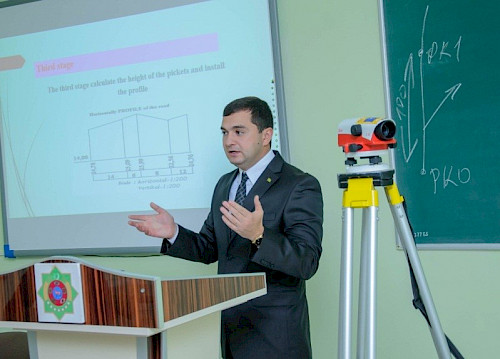 |
||||
|
Erasmus+ success story Host University: Kazakh-German University Home University: S. Niyazov Turkmen State Agricultural University |
||||
|
There are numerous opportunities for the university staff to grow and evolve in Erasmus+ international projects since professional development prospects in higher education are often limited. Erasmus+ projects’ innovative approaches are ideal sources for fresh and original ideas stimulating participants to build and develop strong professional and personal relations. The joint project activities contribute to reveal the potential of each member, motivate to improve professionally and personally, and, also, open opportunities for professional growth and career goals. Govshut Shadurdyyev, a geodesist by specialty (a graduate of Belorussian National Technical University), currently works as a teacher at S. Niyazov Turkmen Agricultural Academy and is actively involved in Erasmus+ projects NICOPA and GEOCLIC. In 2021, Govshut entered a Kazakh-German University master’s programme in Integrated Water Resources Management. Due to the Pandemic he studied the first year remotely. Govshut told, that “participating in the NICOPA project, he could look at his profession from another angle." In 2021, Govshut entered a Kazakh-German University master’s programme in Integrated Water Resources Management. Due to the Pandemic he studied the first year remotely. |
||||
|
Govshut told, that “participating in the NICOPA project, he could look at his profession from another angle."
|
||||
|
Then Govshut took part in another Erasmus+ project - GEOCLIC, and it was this that inspired his future choice:
The topic of Govshut’s master thesis is "Seasonal forecasting of Amu Darya River flows to monitor and manage the water balance and resources." Forecasting the runoff of the Central Asia largest and vital freshwater river is very relevant for the region as its waters are used by several countries - Tajikistan, Kyrgyzstan, Afghanistan, Uzbekistan and Turkmenistan. Govshut says:
Govshut explains that the types of often used forecasting simulations require large amounts of data from different hydropower stations. And, since the countries are reluctant to share such information, in this regard, there is not enough data to assess the situation. Therefore, in his master's thesis, Govshut is going to build a model under conditions of insufficient data from gauging stations in combination with remote sensing data. He intends to analyze the obtained data and, afterwards, to build time-series empirical model using QGIS and R/RStudio.
Participation in Erasmus+ projects opens new horizons for participants: opportunities to discover new countries and foreign languages, to meet new friends and like-minded people. It is a unique experience that will make you more resilient to stress and changes, and also help you develop communication skills, orientation in an unfamiliar environment, teach you how to cope with difficulties, give interesting acquaintances and knowledge, and, perhaps, even become the first stage to completely new horizons. In a word - your life will definitely change! |
||||